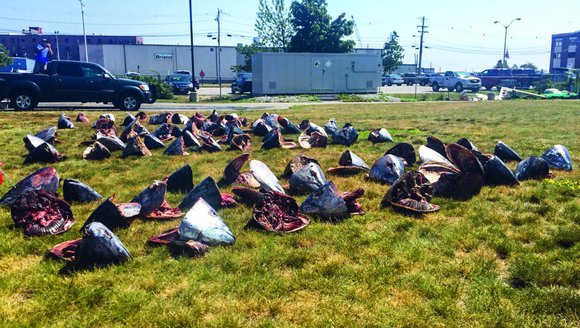Quantitative Fisheries Research
Our lab conducts research and participates in science advisory work to improve the management of ecologically and economically valuable marine resources.
Our science contributes to the sustainability and resilience of marine resources, ecosystems, fishing communities, and the seafood industry.
We aim to:
- Understand the influence of climate, harvest, and management on our fishery resources.
- Develop approaches to improve fisheries stock assessment and management.
- Advance the study of fish population structure and its implications for sustainable management and fishery resource resilience.
- Understand aspects of fish population biology and dynamics in relation to key factors (e.g., climate and ecosystem factors and fishing).
Lab Team
Our Methods
Our diverse skill set addresses critical ecological questions that directly apply to fisheries management.
We conduct field sampling or partner with the fishing industry to collect data on focal species (e.g. Atlantic cod, bluefin tuna). We utilize mathematical and statistical modeling to understand how fish stocks respond to climate change, fishing, and management measures (e.g. management strategy evaluation). We also conduct stock identification analysis in the lab, utilizing structural and chemical analysis of fish hard parts (e.g. otoliths) to understand the origin of the fish we catch and integrate this information into models.
-
Field Sampling
-
Data Collection
-
Mathematical Modeling
-
Stock Identification
Our diverse skill set addresses critical ecological questions that directly apply to fisheries management.
We conduct field sampling or partner with the fishing industry to collect data on focal species (e.g. Atlantic cod, bluefin tuna). We utilize mathematical and statistical modeling to understand how fish stocks respond to climate change, fishing, and management measures (e.g. management strategy evaluation). We also conduct stock identification analysis in the lab, utilizing structural and chemical analysis of fish hard parts (e.g. otoliths) to understand the origin of the fish we catch and integrate this information into models.
- Field Sampling
- Data Collection
- Mathematical Modeling
- Stock Identification
Lab Projects
Explore our quantitative fisheries research projects.
-
![Northeast Climate Integrated Modeling (NCLIM)]()
Northeast Climate Integrated Modeling (NCLIM)
Transforming fisheries' decision-making processes from dependent on historical observations to more a forward-looking process will require interdisciplinary research efforts that advance our knowledge and understanding …
-
![Integrating Climate Impacts into Atlantic Bluefin Tuna Stock Assessment]()
Integrating Climate Impacts into Atlantic Bluefin Tuna Stock Assessment
Our project is examining atmospheric and oceanographic changes that may have impacted the distribution of giant bluefin tuna in the Gulf of Maine. This information …
-
![The Open Knowledge Network to Meet Ocean Decision Challenges (OceanOKN)]()
The Open Knowledge Network to Meet Ocean Decision Challenges (OceanOKN)
Throughout history, people have been able to rely on their past experience to inform their decisions about the future. We are now entering a period …
-
![Evaluating Alternative Harvest Control Rules for New England Groundfish]()
Evaluating Alternative Harvest Control Rules for New England Groundfish
The New England Fishery Management Council (NEFMC) initiated a groundfish harvest control rule review so that fishery management can be sure they are prescribing the …
-
![Snap-a-Striper]()
Snap-a-Striper
Striped bass catches have declined dramatically in recent years — with landings down by 90%, according to some estimates — leaving both scientists and fishermen …
-
![Groundfish Management Strategy Evaluation]()
Groundfish Management Strategy Evaluation
The impacts of climate change on marine fisheries resources are increasing. Some groundfish stocks, such as Georges Bank cod, have declined to record-low biomass in …
-
![Evaluating Age Structure, Aging Bias and Mixed Stock Composition of Atlantic Bluefin Tuna in the Northwest Atlantic]()
Evaluating Age Structure, Aging Bias and Mixed Stock Composition of Atlantic Bluefin Tuna in the Northwest Atlantic
Our project sets up long-term biological sample collections to fill in life history gaps, including age structure and stock mixing. We do this by using …
-
![Evaluating the Importance of Chub Mackerel in the Diet of Highly Migratory Species]()
Evaluating the Importance of Chub Mackerel in the Diet of Highly Migratory Species
Our project seeks to investigate the foraging ecology of marlins (blue, white, round-scale spearfish) and tunas (bigeye, yellowfin) along the East Coast to identify the …
-
![Assessing Allocation Strategies for Fisheries Affected by Climate Change]()
Assessing Allocation Strategies for Fisheries Affected by Climate Change
Our project aims to develop guidance and adaptive strategies for fishery managers grappling with climate change induced allocation challenges.
Read More
-
![Windjamming on the Warming Gulf of Maine - Eos]()
Windjamming on the Warming Gulf of Maine - Eos
Press Clips
-
![Bluefin Tuna Milestone]()
Bluefin Tuna Milestone
Dr. Walt Golet and his Pelagic Fisheries Lab celebrate a significant sampling milestone.
Tidings
-
![Determining Where Bluefin Tuna Come From | On The Water]()
Determining Where Bluefin Tuna Come From | On The Water
Press Clips
-
![Convening Climate Experts]()
Convening Climate Experts
In April, GMRI scientists hosted a modeling workshop for over 30 leading climate, oceanography, socio-economic, and fisheries experts. The group convened to discuss a question …
Tidings












